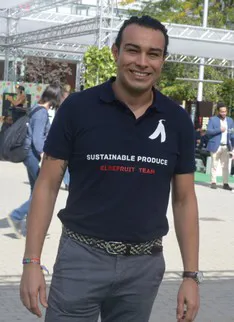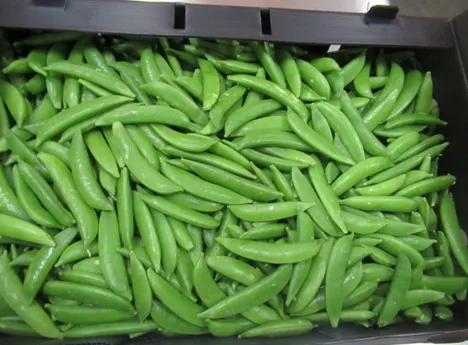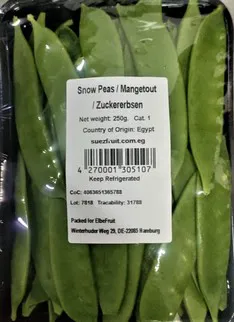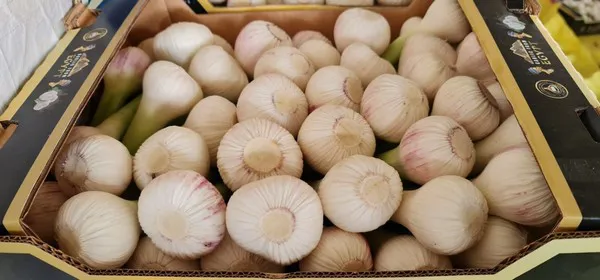In the field of sugar  snap peas and snap peas, batches from three countries of origin, namely Egypt, Guatemala and Kenya, are now hitting the market. "We have plenty of goods available to us at the moment, whether sea or air freight. Although we try to offer the buyer ship goods if possible due to the CO2 balance, we have set out to become the most sustainable sugar snap pea supplier on the market. In Egypt, we are doing better and better, and in Kenya, too, we are trying to import goods by sea freight bit by bit," describes Edgar Günther, importer and managing director of ElbeFruit Ltd.
snap peas and snap peas, batches from three countries of origin, namely Egypt, Guatemala and Kenya, are now hitting the market. "We have plenty of goods available to us at the moment, whether sea or air freight. Although we try to offer the buyer ship goods if possible due to the CO2 balance, we have set out to become the most sustainable sugar snap pea supplier on the market. In Egypt, we are doing better and better, and in Kenya, too, we are trying to import goods by sea freight bit by bit," describes Edgar Günther, importer and managing director of ElbeFruit Ltd.
Right: Elbefruit boss Edgar Günther at Fruit Attraction 2022.
Despite numerous challenges, ElbeFruit can look back on a successful 2022 overall. Günther: "We were able to expand both our sales and our market presence. For example, we were able to access pulses from Peru for the first time, which we were able to offer until the end of December. In Kenya, we are observing consistent volumes and qualities this year, while in other years we have had to deal with volume and quality losses due to the weather."
In Egypt, on the other hand, the start of the season has been somewhat delayed this year, Günther continues. "The first snap peas could only be shipped to Europe after the turn of the year; normally, we already have goods available in December. But since we can switch to several countries of origin, we still managed well." Snap peas from Guatemala, arrived via ocean freight in week 1. Guatemalan produce is typically offered between December and April and August and September. The Egyptian sales window runs from December through March. Kenya is present almost year-round with fluctuating volumes.
Snap peas from Guatemala, arrived via ocean freight in week 1. Guatemalan produce is typically offered between December and April and August and September. The Egyptian sales window runs from December through March. Kenya is present almost year-round with fluctuating volumes.
Volatile market
The specialized  importer continues to face significant cost increases. In the case of Guatemalan products, the price is sometimes up to 30 percent above the previous year's level, says Günther, pointing to the extreme volatility of pulses.
importer continues to face significant cost increases. In the case of Guatemalan products, the price is sometimes up to 30 percent above the previous year's level, says Günther, pointing to the extreme volatility of pulses.
Right: Egyptian sugar snap peas, arriving by sea freight in week 3
In the longer term, however, sugar snap peas tend to become more difficult to source, he says. "This is certainly related to the increased production costs that are only partially accepted on the part of the consumer, which in turn has a negative impact on demand. Otherwise, there are more interesting alternatives from the grower's point of view in countries like Peru and Zimbabwe, such as blueberry."
Guatemala loses market share
Guatemala has already scaled back exports to Europe in favor of the U.S. market, Günther adds. "When it comes to pesticide consumption, the European grocery store is particularly demanding. In addition, overseas exports to Europe definitely come with higher costs and risks. This has been exacerbated by the fact that Seatrade no longer offers a direct sea line between Guatemala and Europe. In practice, this means that sea transport nowadays sometimes takes over three weeks instead of 14 days, which in turn has a negative impact on product quality." The first batches of Egyptian garlic are being shipped in parallel with the legume season.
The first batches of Egyptian garlic are being shipped in parallel with the legume season.
In the wake of this development, other countries of origin, first and foremost Egypt and Kenya, have been able to expand their position in the European market. Günther: "Guatemala always set the tone for pulses, but that is now slowly changing. In that respect, the market is clearly changing."
Images: Elbefruit Ltd.
Visit the company at Fruit Logistica at the IPD booth: hall 25 / C03.
For more information:
Edgar Günther
Elbefruit GmbH
Mobile: +49 157 5175 1475
Office: + 49 40 2999 64 304
[email protected]
www.elbefruit.eu










